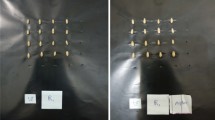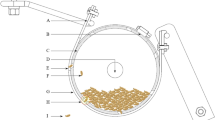Abstract
THE usual method of measuring rate of water uptake by seeds is to weigh samples after different periods of imbibition. This method is not free from errors as the seeds have to be freed from adherent water before weighing, which cannot be done accurately, and, during handling and weighing, loss of water always occurs by evaporation. Furthermore, different lots of seeds have to be used for the various measurements, which is cumbersome and a disadvantage in cases where only small amounts of seeds are available.
This is a preview of subscription content, access via your institution
Access options
Subscribe to this journal
Receive 51 print issues and online access
$199.00 per year
only $3.90 per issue
Buy this article
- Purchase on Springer Link
- Instant access to full article PDF
Prices may be subject to local taxes which are calculated during checkout
Similar content being viewed by others
References
Kruyt, W., “A Study in Connection with the Problem of Hormonization of Seeds” (Dissert. Amsterdam, 1954).
Author information
Authors and Affiliations
Rights and permissions
About this article
Cite this article
KLEIN, S. A Simple Potometer for measuring Rate of Water Uptake by Small Seeds. Nature 177, 707–708 (1956). https://doi.org/10.1038/177707b0
Issue Date:
DOI: https://doi.org/10.1038/177707b0
Comments
By submitting a comment you agree to abide by our Terms and Community Guidelines. If you find something abusive or that does not comply with our terms or guidelines please flag it as inappropriate.



